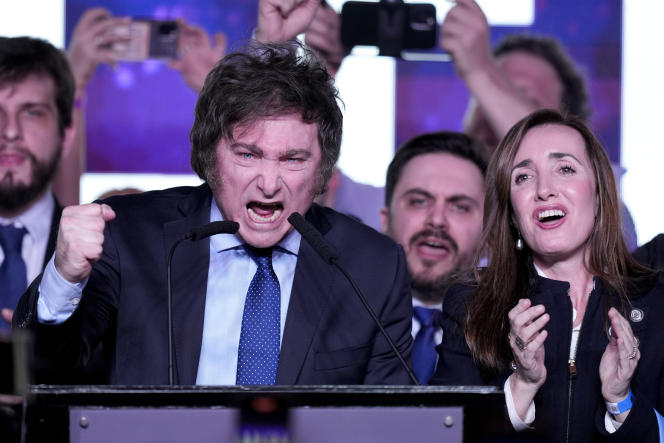Populist Javier Milei, 52, who presents himself as an anti-system candidate, created a sensation in Argentina on Sunday August 13 by becoming the one who collected the most individual votes at the national level in the presidential primary, according to the provisional results relating to more than 93% of the ballots counted.
With more than 30% of the votes, he is ahead of Patricia Bullrich, 67, who, in an undecided primary on the right, took the advantage over the mayor (center right) of Buenos Aires, Horacio Larreta, with more than 28% of the votes. voice ; and Sergio Massa, Minister of the Economy, who unsurprisingly won the vote in the government camp, but came third overall with 27% of the vote on his behalf.
During these PASO (for “open, simultaneous and compulsory primaries”), more than 35 million Argentine voters were called upon to preselect both the parties that will be in contention on October 22 – they needed to obtain 1.5 % of votes nationally − and their candidates. Twenty-two “president + vice-president” tickets were in the running, of which only half a dozen should remain after the final vote count.
An economy to recover
The outgoing Peronist President Alberto Fernandez, unpopular, is not running again, and his succession looks uncertain, after the successive failures of his administration, before him that of the liberal Mauricio Macri (2015-2019), to restore the third economy of Latin America. It is trapped between two-digit inflation for twelve years (recently increased to 115% over the year), a colossal debt with the IMF, poverty at 40%, and a currency, the peso, which is unscrewing.
Also the PASO 2023, which sometimes serve as a life-size survey prefiguring the presidential election, were scrutinized carefully. The mobilization, at 69% – and despite compulsory voting – is far below the primaries of four years ago (76.4%), reflecting the disenchantment of the electorate.
“There is a growing disaffection of the electorate, in a country which had marked political identitiesdiagnoses Juan Negri, political scientist from the Torcuato di Tella University. Milei reflects this disenchantment among many voters who no longer believe in parties. »
Facundo Cardozo, a 27-year-old salesman near a Porteno polling station in Barrio Norte, illustrated on Sunday the appeal of a radical Milei-type solution, “as things stand”. “You have to break what has been done, then put the pieces back together and start all over again”he told Agence France-Presse (AFP).
Incendiary language and affinities with Trump
Mr. Milei, a media economist for a few years, had burst onto the political scene in the partial legislative elections of 2021, his party Libertad Avanza (“Freedom advances”) becoming the third force in Buenos Aires (17.3%). But a strong doubt remained on its penetration across the country. His score, which exceeds poll forecasts, places him de facto as a serious candidate for the presidency, or at least for a possible second round on November 19.
“We have succeeded in building a competitive alternative, which will put an end to this parasitic, thieving, useless political caste”launched Javier Milei on Sunday evening to his jubilant supporters.
The World App
The Morning of the World
Every morning, find our selection of 20 articles not to be missed
Download the app
“anarcho-capitalist”, as he describes himself, libertarian, but also liberal (favorable to all kinds of free unions), he wants, among other things, to eventually abolish the Central Bank, ban abortion (legalized in 2020), liberalize the sale of weapons, and plans to open a market for the sale of organs. But above all, in incendiary and sometimes insulting language, he wants to release “kicking in the ass” there “political caste” which, according to him, “parasite” Argentina for thirty years.
Between privatization and deregulation, his radical proposals, like a “chainsaw blueprint” in public services, have often shocked. But they also shook up the political debate, raising almost taboo themes, such as an assumed dollarization of the Argentine economy.
He promised to make Argentina a ” power “as when she was ” promised land “ European emigration, at the beginning of the XXe century. A theme of “found greatness” which is reminiscent of Donald Trump, with whom he claimed an affinity.
Political experience
Facing him, Patricia Bullrich will try to bring her political experience into play. Coming from a large Argentine family, of agrarian and eminently political fortune, which included several ministers and mayors of Buenos Aires, the candidate of the party Juntos por el Cambio (“United for change”) participated in several governments, under the centrist Fernando de la Rua (1999-2001). She was Minister of Security under Mauricio Macri (2015-2019), a passage which earned her controversy over her muscular management of demonstrations, and the beginning of an image of mano dura (“iron hand”), which she does not deny in any way.
” It’s all or nothing “ is the campaign slogan of Mme Bullrich, who notably has in his sights a severe audit of social assistance programs, budget cuts, and the liberalization of exchange controls, at the risk and peril of the peso. And, at the same time, put a stop to recurring social protests in Buenos Aires.
On the left, it may seem amazing that Sergio Massa, the minister of an over-indebted economy, with galloping inflation, could be a credible candidate for the presidency. It is the art of the candidate Frente Renovador (“The Renewal Front”), 51, an elegant and affable lawyer by training but a full-time politician for twenty-five years, to have traced his furrow between alliances to the point to become, if not unavoidable, at least the least bad option for an unpopular executive.
Mr. Massa, with centrist DNA, was chief of staff of the Peronist presidency Cristina Kirchner, then presidential candidate in 2015 against these same Peronists, before allying himself with them again in 2019, and being entrusted in 2022 with a “super-ministry” of the economy, as an emergency firefighter at the bedside of an economy in intensive care.
